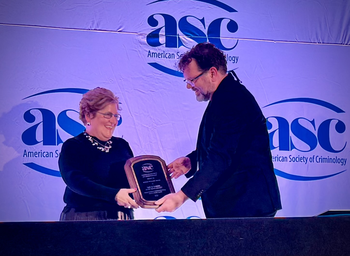In This Story

Like many Americans, Faye S. Taxman grew up with a loved one who suffered from a substance use disorder that resulted in anguishing involvement with the criminal justice system. The trauma and hardship of this experience was at times devastating. To Taxman’s thinking, most of it was avoidable, if decent treatment were available and the criminal justice system was not laser-focused solely on incapacitation. Taxman realized that her family’s experiences with the criminal justice system were not unique. In fact, they became routinized, especially within African American and Latino communities, as part of the nation’s “war on drugs.”
For Taxman, the confluence of her family’s experiences and her academic training grew into a pioneering career in criminology, one that has had an enormous impact on both the criminal justice and health care fields. In recognition of her accomplishments, the American Society of Criminology in November presented Taxman with its highest accolade, the 2023 August Vollmer Award, which is given to “the individual whose scholarship and professional activities [have] made outstanding contributions to justice and/or the treatment or prevention of criminal or delinquent behavior.” As ASC President Shadd Maruna pointed out, Taxman “is a very deserving recipient of the Vollmer Award, which is meant to celebrate criminological scholarship that has an impact on the real world of justice practice and reform.”
Taxman, a Distinguished University Professor at George Mason University’s Schar School of Policy and Government, has had notable success in both using technology to identify treatment programs and motivate individuals with substance use disorders to use them and in reimagining the relationship between the individuals and an assigned officers. Regarding the former, Taxman has developed a computerized intake systems that uses motivational enhancement strategies to identify appropriate treatment programs for individuals with specific needs. The intake system also integrates motivational interviewing to help individuals see the value in participating in treatment programs. This is one of many technological based interventions she has developed. Now she is working on an app, currently being field tested, that helps individuals to set goals, monitor their own progress, and share information with their treatment providers and/or probation officer. Further, the app helps individuals learn to ask for assistance, which is often hard to do.
“We need to recognize that, in responding to substance abuse issues, many people experience bumps in the road,” Taxman said. “If we provide people with support and quality treatment, within and out of the justice system, we can help them to overcome these bumps.”
Taxman has also done pioneering work to create more nurturing and productive relationships between individuals on supervision and their assigned officers, with the goal of reducing the rate of re-incarceration and involvement in crime. Early on, she identified two problems with the probation and/or parole systems, one being the large number of caseloads assigned to officers and the other being the fact that the officers were not using effective clinical strategies to facilitate successful outcomes. Taxman developed a new model of proactive supervision, which has come to be known as risk-need-responsivity supervision. It has become the leading model for community supervision in the United States and in many parts of the world. Taxman’s approach integrates various evidence-based approaches including using validated screening tools; motivational interviewing; targeted services to address needs such as drug use, mental illness, employment, education, and prosocial values; and incentives to motivate individuals to be successful on supervision. Few supervision agencies used this kind of approach before Taxman conducted a randomized cluster trial that demonstrated its impact on reducing recidivism. Based on the success of her proscribed practices, Taxman now has worked directly with more than 40 states and more than 90 agencies to implement systems of risk-need-responsivity supervision.
Taxman is notable not simply for her groundbreaking research that has pointed a way toward better approaches to supervising parolees and ensuring that they receive the help they need but also for her ability to work with large bureaucracies to implement change. She was one of the first scholars to apply implementation science to reforms for the criminal justice system.
“While it is important to understand ‘what works,’ it is even more critical to help organizations implement changes in practices,” Taxman said. “Implementation is where the rubber meets the road, and new implementation methods are available to improve the adoption of these innovations. Few agencies use these strategies, and we conduct studies to help agencies learn to use these techniques.”
Much of the work that Taxman oversees as the director of Schar School’s Center for Advancing Correctional Excellence (ACE!) involves working with agencies to implement reforms, study the efficacy of the reforms and the implementation efforts, and continue to make tweaks as new information emerges. Her team at ACE! has ongoing relationships with 67 national associations to implement science into practice. ACE! provides a fertile ground for students to learn and apply rigorous research methods in the design and implementation of innovations.
